

Breathing life into the UK economy Report Final. Circular economy can bring benefits all round. FullNBMConference2019Proceedings. Innovative business models map. Making the business case for resource recovery. Circular economy and the matter of integrated resources. Agrimax, 2017 AgrimaxSet up of the cooperative processing business model: proceedings on the stakeholder workshop on agri-food processing waste sustainable supply chains Aldersgate Group, 2017 Aldersgate GroupAmplifying Action on Resource Efficiency (EU edition) (2017) Bajracharya et al., 2016.
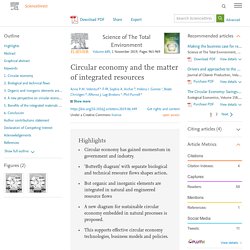
How,sustainable,is,the,circular,economy. Ecopreneur Circular Economy Update report 2019. PB on CEBM FINAL. Policy highlights business models for the circular economy. Algramo makes it easy to use reusable containers. Social enterprise solutions to the climate emergency - Third Force News. Duncan Thorp examines how social enterprises can provide answers to the climate emergency 2nd August 2019 by TFN Guest Large numbers of people around Scotland and the world are beginning to understand the stark reality of climate change.

Established campaigners have now been joined by radical direct action groups like Extinction Rebellion. Many social enterprises across Scotland already understand their responsibilities in confronting this challenge and strive to fulfil their own vital environmental mission. Their particular focus might be recycling, land management, regeneration or some other green mission - but they’re all united in improving the natural environment in some way. According to the 2017 Social Enterprise Census, 30% of social enterprises have an explicit remit to protect or improve the environment, 21% to reducing waste and 18% improving built or natural heritage.
Social Enterprise, the future of business? New Business Models- Not Technology- Will Transform the Legal Industry. New business models are the key to innovation, not new technology.
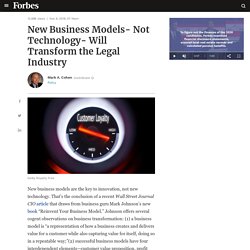
That’s the conclusion of a recent Wall Street Journal CIO article that draws from business guru Mark Johnson’s new book “Reinvent Your Business Model.” How does the legal industry align with Johnson’s observations? Co-operatives UK. How are retail co-ops helping to protect the environment? How co-ops can help communities guard against climate change. 2019 Climate Awards Offer a Glimpse of the Future of Food. Farmers harvest fresh chamomile at the Brindavan Farm in Lucknow, India.
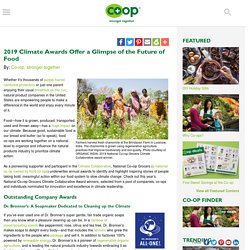
The chamomile is grown using regenerative agriculture practices that improve biodiversity and soil quality. Photo courtesy of ORGANIC INDIA, 2019 National Co+op Grocers Climate Collaborative award winner. Whether it’s thousands of purple-haired rainforest protectors or just one parent enjoying their usual breakfast on the run, natural product companies in the United States are empowering people to make a difference in the world and enjoy every minute of it. Food—how it is grown, produced, transported, used and thrown away—has a huge impact on our climate. Because good, sustainable food is our bread and butter (so to speak), food co-ops are working together on a national level to organize and influence the natural products industry to prioritize climate action. Change The Rules. YnNi Teg develops and builds renewable energy generators in Wales, funded by community shares.
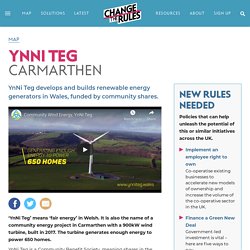
‘YnNi Teg’ means ‘fair energy’ in Welsh. It is also the name of a community energy project in Carmarthen with a 900kW wind turbine, built in 2017. The turbine generates enough energy to power 650 homes. YnNi Teg is a Community Benefit Society, meaning shares in the society are owned by individuals around Wales, the UK and internationally. Browse Top Freelancers by Category. Here’s What Could Go Wrong with the Circular Economy—and How to Keep it on Track. The circular economy—one that breaks the link between economic growth and use of limited resources and also cuts waste from the system—is on the minds of corporate sustainability professionals, governments and researchers.
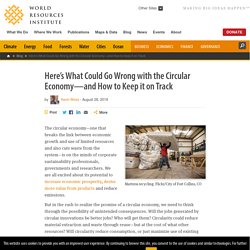
We are all excited about its potential to increase economic prosperity, derive more value from products and reduce emissions. At these supermarkets, lettuce grows in the produce section. Seven crucial global trends for sustainability in the 2020s. 4 key steps towards a circular economy. Moving towards a more circular economy is a logical proposition.
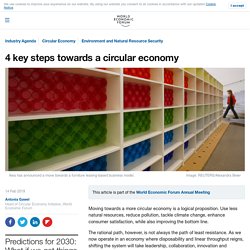
Use less natural resources, reduce pollution, tackle climate change, enhance consumer satisfaction, while also improving the bottom line. The rational path, however, is not always the path of least resistance. Scotland Announces £70m Boost For Circular Economy Ambitions. Bespoke support and a new Centre of Excellence to help Scotland’s manufacturers innovate and expand have been announced by First Minister Nicola Sturgeon (pictured).
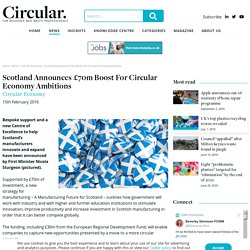
Supported by £70m of investment, a new strategy for manufacturing – A Manufacturing Future for Scotland – outlines how government will work with industry and with higher and further education institutions to stimulate innovation, improve productivity and increase investment in Scottish manufacturing in order that it can better compete globally. The funding, including £30m from the European Regional Development Fund, will enable companies to capture new opportunities presented by a move to a more circular economy. This includes a Circular Economy Investment Fund to help manufacturers develop innovative technologies, business models and infrastructure, from the proof of concept stage through to implementation.
“This makes great economic as well as environmental sense. Toolkit to maximise Scotland’s “potentially lucrative” circular economy - Circular Online. Ways in which Scottish businesses can maximise opportunities in the “potentially lucrative circular economy” and respond to the “climate emergency” are laid out across a new website launched today (3 June) by Zero Waste Scotland.
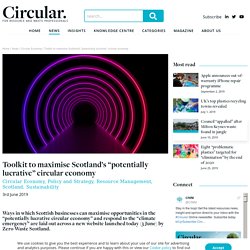
A Circular Concept: How Businesses Can Speed Their Climate Work - Impakter. The Concept: Cycling Profits Among Sustainable Businesses Mark Esposito, professor of business and economics at Harvard University and the Grenoble School of Management, defines the circular economy as a “no-waste industrial chain that promotes economic growth using the least amount of non-renewable natural resources as possible.”
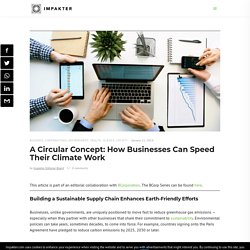
To give you an example, Levi Strauss & Co is working to implement its own no-waste chain by manufacturing jeans from recycled textiles, a process that requires significantly less water than making jeans from new cotton. The company now accepts textiles for recycling in all of its stores and aims to implement a closed loop recycling-to-manufacturing system by 2020. Videos from 'Mobilising New Economic Futures' - Political Economy Research Centre. This summer, New School Economics, the Goldsmiths student society for economic pluralism, hosted a superb conference, ‘Mobilising New Economic Futures’, featuring an impressive and interdisciplinary range of speakers, including Ann Pettifor, Jay Watts, Alan Finlayson, Jeremy Gilbert, Phoebe Moore and many more.
Videos of the various panels are online and can be watched below. Circular economy isn't enough. We need… 17th Jun 2019 by Guest Authors The concept of "circular economy" isn't new: end waste & limit environmental damage through efficiency, smart design, and comprehensive recycling. But can the concept live up to the hype?